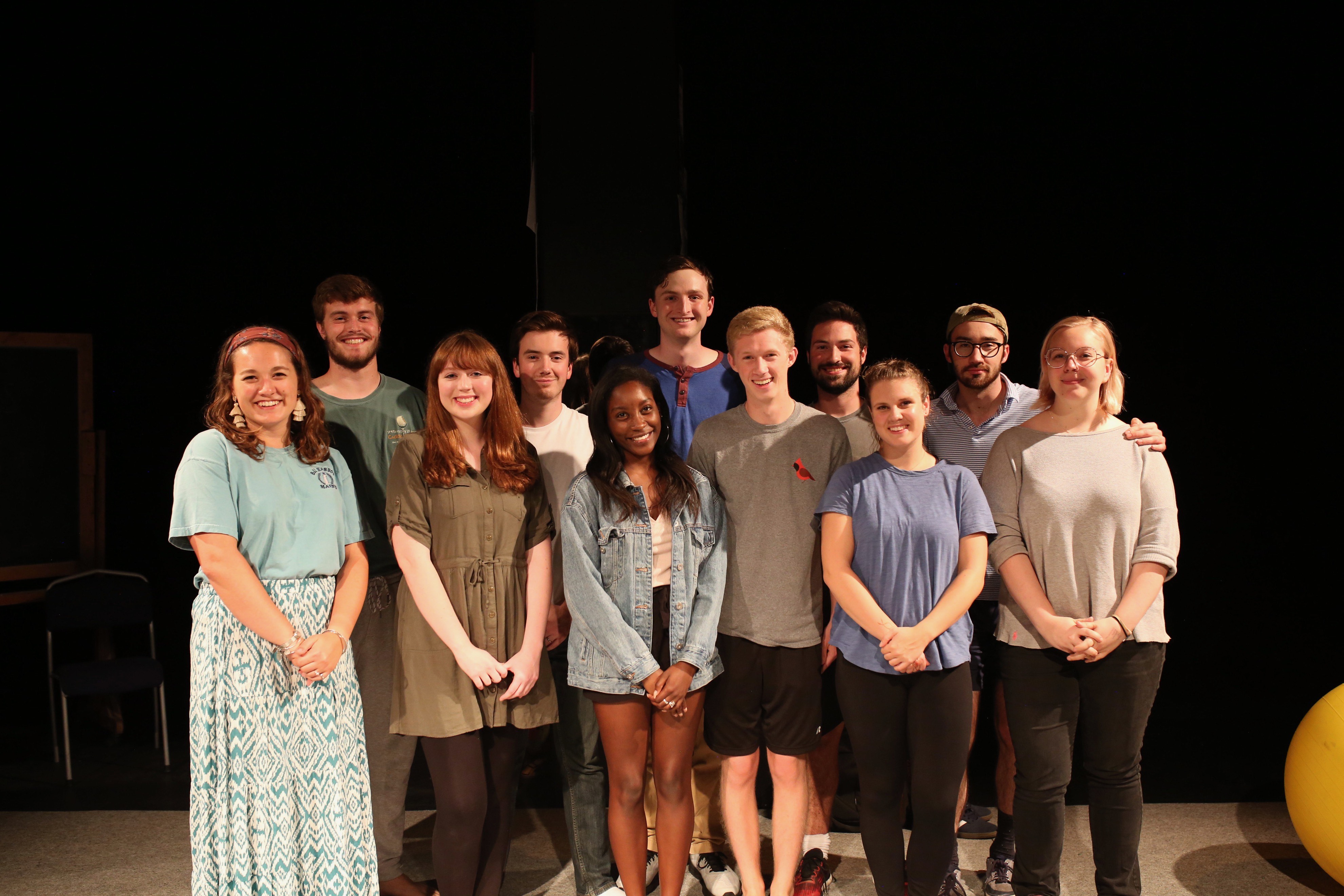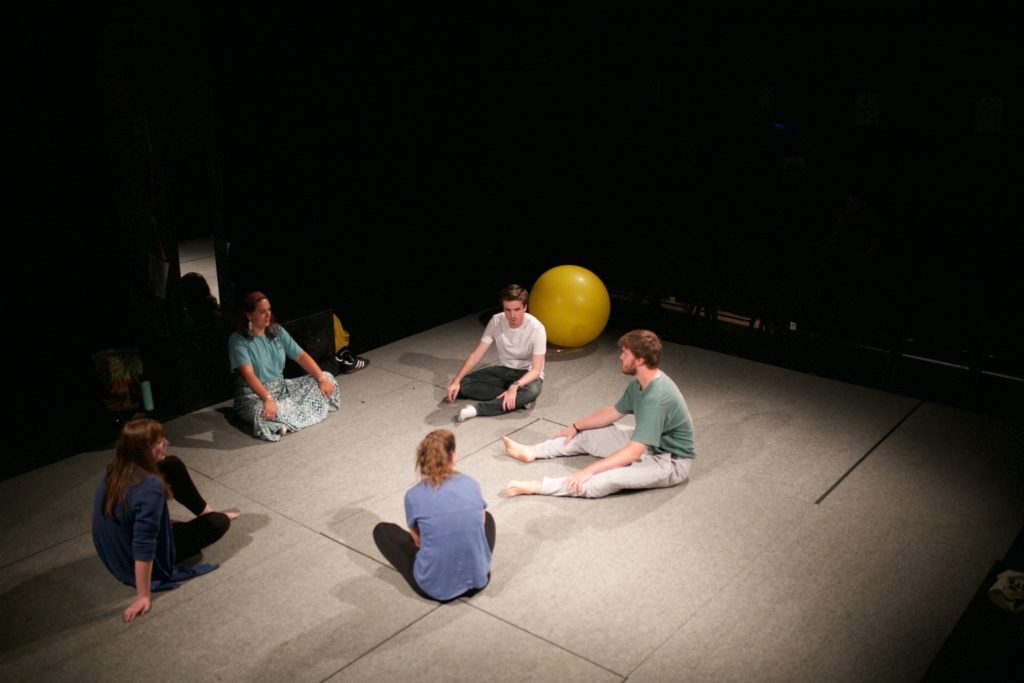Circle Mirror Transformation

Front row, from left: Amanda Martin ("Marty"), Marie Elise ("Theresa"), Aletha Saunders (Stage Manager), Brandon Horwin (Director), Abby Riddlesberger ("Lauren") and Lily af Geijerstam-Lindberg (Costume Designer). Back row, from left: Austin Howe ("James"), Connor Hurley ("Schultz"), Russell Smouse (Assistant Director), Joe Savattieri (Co-Technical Director/Lighting Designer), and Michael Sullin (Co-Technical Director/Sound Designer).
Image courtesy of Brandon Horwin
By Shannon Miekka
Circle Mirror Transformation, performed October 4-6 in the Hartke Lab Theatres, excelled in its refreshing vulnerability and intimacy of setting. Directed by Brandon Horwin, a junior drama major, the obscure one-act play brings significance to the seemingly mundane and finds connections in unexpected places. The smart direction, minimal technical aspects, and raw performances came together in a way that would almost surely be approved by the playwright herself.
Annie Baker’s Obie Award-winning one-act play follows a six-week community center acting class led by the quirky Marty (Amanda Martin). Breaking away from a typical narrative structure, the story is told through a series of acting exercises and vignettes. The tempo caused the audience to laugh uncomfortably and wonder what they had gotten themselves into- a response which I would argue is exactly what Baker and Horwin wanted. Before long, the discomfort faded, making the audience more comfortable as the characters became more vulnerable.
The cast made Baker’s story shine in a way that sits with the audience long after it ends. In the wrong hands, the script could have easily been less effective and come off as embarrassing. The show required the cast, just as Marty requires her students, to perform potentially humiliating actions– including, but not limited to: act like a stuffed snake, cry on a yoga ball, and hoop, which is the technical term for hula-hooping according to the show.
Marty, played by senior Amanda Martin, is instantly familiar to anyone with theatre experience; she portrayed the over-eager, hippie-dippie acting teacher, whose techniques make one of her students ask if what she was teaching was even “real acting”. Martin made Marty’s invulnerability appear vulnerable, as she evolved with her students throughout the six weeks.
While the characters were ordinary at the start, the ability of each actor to bring them to life in such a natural way was anything but. Rounding out Marty’s ragtag team was James (Austin Howe), Marty’s husband, whose outward cheeriness masked a deeper sensitivity; Schultz (Connor Hurley), a depressed and newly-divorced carpenter; Theresa (Marie Elise), an ex-Manhattanite on the brink of giving up her acting dream; and Lauren (Abby Riddlesberger), the youngest participant of the class, who wanted to get the lead in her upcoming school play. With characters whose ages range across forty years, Horwin’s choice to not age up the actors added to the show’s intrigue, as the audience eagerly awaited the next detail of their lives.
Every character was given both light and heavy moments, yet no one in this cast struggled under the weight of demonstrating such intense vulnerability. Instead, they took the script as an opportunity to display their range. Though not without her own noteworthy dramatic moments, junior Abby Riddlesberger provided much needed comic relief, sometimes without even uttering a word. Senior Marie Elise captured the energy of an aspiring actress, and her expert navigation of Theresa’s many one-on-one scenes made them something to look forward to. The character of James could’ve landed as more one-note, since he began the show as more of a canvas than an instigator. However, senior Austin Howe’s performance was magnetic. Even when he didn’t have a lot on the page, he remained immersed in all of the action; when he did have material, he made it sing, providing one of the more emotionally raw performances of the group. While it’s difficult to single anyone out in such a talented cast, Connor Hurley had a large task ahead of him in eliciting sympathy for Schultz, a character who was supposed to rub the audience the wrong way. Hurley came off incredibly natural and human from the moment the show began. Hurley was impressively comfortable in uncomfortable silences.
It should be noted that Annie Baker’s script was not intended to make the audience comfortable. The pacing was so close to the real life pace of conversation that the audience loses track of all the “ums” and awkward pauses by the first scene. Yet, every choice still felt intentional. This balance was hard to strike and it’s possible that the production could have benefitted from a slight tightening of the rhythm, making the intense moments stand out as all the more punctuated and deliberate.
While the production is very minimal in terms of tech, Joe Savattieri’s lighting design should not go unpraised. I felt like I was in on a secret when I noticed a certain light cue mid-show that cast a reflection of the center stage mirror onto the floor- a moment enhanced by the lighting’s beautiful simplicity. Dividing the scenes with full blackouts, while true to the original Off-Broadway production, is still a bold and divisive choice, very much like the nature of the material.
In a time where the new trend in theatre is seamless, quick-paced transitions that don’t hold for the audience to catch its breath, there’s something to be said about a show that takes its time. It doesn’t care if the audience is uncomfortable. In fact, it prefers it. It encourages the audience to reflect during each blackout, pause, and moment of silence on their own growth and development. As the title suggests, through theatre, we come together, reflect, and hopefully leave transformed, just like Marty and her students.








